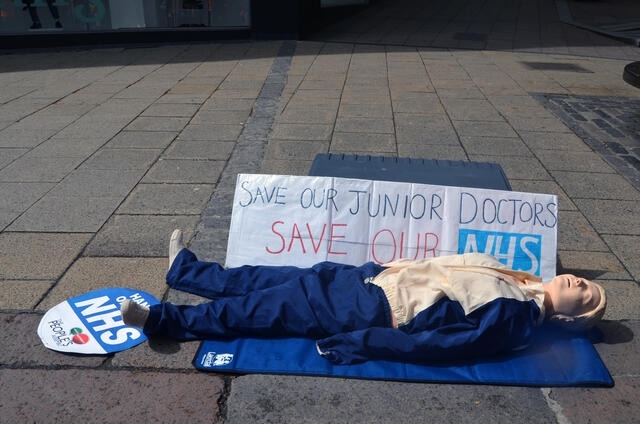National Health Service employee dispute with Rishi Sunak’s government continues. The NHS junior doctors’ strike, impacting health services, prompts advisories for patients to only visit hospitals for essential needs. The upcoming January 2024 strike is expected to disrupt medical services further. The protesters seek wages aligned with inflation, but the government contends it’s financially untenable due to potential inflationary consequences, especially with declining inflation rates. This piece explores why the dispute between National Health Service employees and Rishi Sunak’s government persists.
The failure of five weeks of doctors’ negotiations with the government over wages
Under the British Medical Association (BMA), doctors declared the NHS’s lengthiest strike following failed negotiations with the government regarding salary hikes and better working conditions. The union engaged in five weeks of discussions seeking a resolution on doctors’ pay. Subsequently, the British Medical Association revealed that the Department of Health and Social Care didn’t present a viable plan to halt the doctors’ ongoing strikes.
Rejection of the proposal to increase the salary of medical interns by three per cent
The BMA disclosed the government’s proposal of a three per cent pay increase for interns and an earlier 8.8 per cent rise. However, this offer was turned down as medical staff argued it aligned with the pay scale of experienced doctors, creating an imbalance akin to a salary reduction for numerous doctors. An NHS England report highlighted that the ongoing strike among government health sector employees led to over one million patient exams and treatments being cancelled.
Schedule of strikes in December and January
After negotiations failed, the BMA’s junior doctors committee unanimously approved the plan to hold strikes in December and January. According to this plan, these doctors planned to go on a nationwide strike from 7 am on December 20 to 7 am on December 23 and from 7 am on January 3, 2024, to January 9. The union announced that the strike, which will be implemented for six full days in January, will mark the longest period of strike by doctors in the history of the National Health Service.
Starting a new round of junior doctors strikes from December.
The junior doctors’ strike in England started from December 20 to 23 in protest against the crisis of living costs, working conditions, and wages. The striking doctors announced they would only provide emergency medical services during their three-day strike. Doctors have been on strike for 26 consecutive days in 2023. At the same time as the strikes of British doctors intensified in protest against the lack of salary increase, medical trainees also joined the ranks of the protestors.
Coincidence of strikes with the outbreak of seasonal respiratory diseases
The continuation of the National Health Service employee dispute with Rishi Sunak’s government has led to widespread disruptions in the provision of medical services to the British. Doctors’ strikes have peaked while the country’s NHS is experiencing one of its busiest periods due to the increased pressure caused by the outbreak of seasonal respiratory diseases. General doctors have threatened to go on a six-day strike next month and at the beginning of the new year if their demands continue to be ignored.
Extension of strikes to all regions of Great Britain
Health care policies are a devolved issue for the governments of Wales, Scotland, and Northern Ireland, and the London government is solely responsible for overseeing England. Junior doctors working in Wales are also set to go on strike for 72 hours starting January 15. Similar strikes will likely occur in Northern Ireland, but their Scottish counterparts have agreed with the Edinburgh government.
Rishi Sunak’s criticism of the strikers
Rishi Sunak, as well as UK hospital chiefs, have criticised the strikes. Senior hospital officials have called the “long strike” their worst nightmare come true. Sunak also said, “We would encourage junior doctors to consider carefully the extremely significant impact striking at such a challenging time will have both on the NHS and for individual patients and to return to talks.” As a result of the doctors’ strike, thousands of surgeries, chemotherapy sessions, cancer tests, and thousands of doctor visits will be postponed.
The decline in the satisfaction of the British with the performance of the NHS
The results of the latest research show that most British people are dissatisfied with the performance of the country’s health system amid a sharp drop in medical services and a widespread strike by doctors, nurses, and ambulance drivers. The joint findings of a survey by YouGov and The Times show that according to two-thirds of the British people, the level of medical services in this country is dire, and 80% believe that the situation has worsened over the past six years, that is, after Britain left the European Union.

